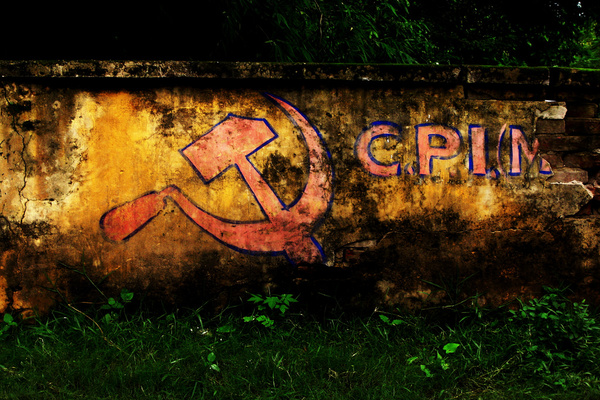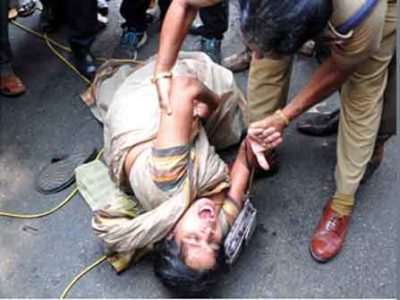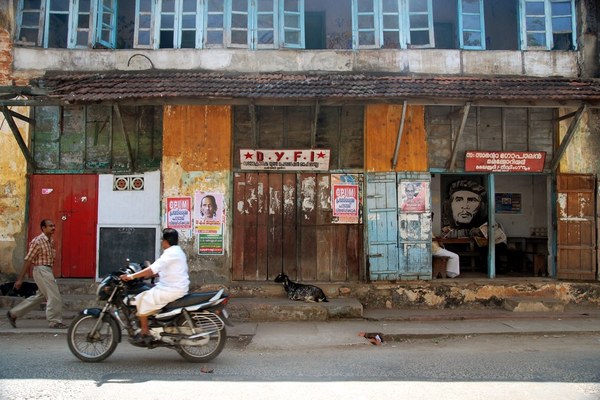08/04/2017
Peace is abstract while violence has its own striking images. The image of Kerala Police officials dragging Mahija, the mother of Jishnu Pranoy, an engineering student who had committed suicide in a private engineering college hostel, could prove to be an image of nemesis for the Left Democratic Front Government led by the ‘lion-hearted’ Pinarayi Vijayan. There is an uncanny resemblance of this image with that of 30 nude women standing in front of the Assam Rifles Headquarters in Manipur in 2004 to protest against the custodial rape and death of Thangjam Manorama, a young woman with alleged links with extremists. The eeriness of this repetition of tragedy intensifies when we know that the Kerala Government had given a heroic welcome to Erom Sharmila, who had spent her sixteen precious years fasting for repealing the draconian Armed Forces Special Powers Act, 1958. Sharmila chose Kerala as her stopover, thinking that this state is progressive, democratic and against anything that has a trace of fascism.
However, the parlance of fascism that has been the daily mantra of the democratic left, which has of late performed phenomenal somersaults from proletariat planks to capitalist liberalism, seems to have weakened considerably with its apparent autocratic moves using cadre power as well as police force. What makes the fall of the left from grace is that its own believers have started questioning the erstwhile proletariat gods. The blunting of the critique of fascism that comes natural to the left became apparent when the former General Secretary of the CPI (M), Prakash Karat, had observed that the BJP-led Central Government was not fascist but only had fascistic traces. That view was unfortunately against the official line of the CPI (M) and Karat was unceremoniously relinquished to sidelines while the party itself was getting marginalised in the national political discourse.
Irony itself seems to have become normative in Kerala ever since the Left has come to power last year. The brand new Communist government, instead of singing a popular and progressive ideological tune, has been comically continuing the same tune of the previous Congress Party-led government. While things are going from bad to worse for the Pinarayi government, which had come to power with the catch phrase, ‘everything is going to be alright,’ the LDF also faces the biggest adverse political reality in Kerala: that the BJP-RSS-Hindu Aikyavedi-Shivsena combine is beginning to occupy the space of a key political opposition.
The biggest headache for the Pinarayi Government seems to be the state police force itself. With unprecedented regularity, the police force in Kerala portrayed itself as inefficient and unruly, worsening its image by behaving like a mob or enthusiastic onlookers who are interested only in capturing photos and videos. The Kerala police recently took a huge drubbing when a series of rape cases surfaced, in which family members of the victims as well as some clergy men were involved. Sadly, in many such cases, the police lunged into action only after a hue and cry was raised by citizens in social media, which was followed by the traditional print and electronic media. The Kerala police, which had a somewhat respectable image in the public eye, seems to have now succumbed to its own internal decaying.
The political pundits who are still in the red blanket say that the police force in Kerala has been infiltrated by the right wing RSS youth. Despite any kind of religious or political affiliations, a police officer is supposed to be neutral and obeying the commands of the superior orders. The notion that the superior officers tend to disobey the political masters is too hard to believe in the given political situation in Kerala. The RSS involvement in the police force is also a result of the feverish political over-imagination that once blamed the CIA in the U.S. for anything that went wrong in India.
It seems that a fear psychosis has gripped the police in Kerala. As a collective, they behave like a mob. The fine demarcations that separate the police and the law-less mobs that function as moral police, have been blurred beyond recognition. The irony which refuses to fade away involves the images of Kerala police failing to control the moral police in Marine Drive, they themselves becoming the moral police on a New Year Evening in Kochi, and finally dragging Mahija who demands justice for her dead son.
Many commentators, while responding to this issue, have said that Kerala has gone into an anarchic state. If delivering social justice and political freedom by democratic methods could be called anarchic, then Sree Narayana Guru, Ayyankali, Mahatma Gandhi and Ambedkar were the pioneering anarchists in India. When Arvind Kejriwal came to power in Delhi and went on a hunger strike on the road in 2014, the media dubbed him as an anarchist, and Kejriwal instantly accepted this tag. But in the current political discourse in Kerala, the word anarchy is used in a different fashion. Kerala’s anarchy comes from an internal collapse of faith. As Yates said, ‘the centre fails to hold,’ today in Kerala, the Left in which the voters have invested their faith, has ‘failed to hold’ the physical as well as psychological togetherness. A disintegrating society immediately feels the loss of its anchor in any kind of faith; the manifestations of it would be in the collapse in familial and social relationships and their sanctity. Each politician would appear as a false prophet. The society will be plagued by fear, betrayal and conceit. That’s why perhaps more left cadres are crossing over to RSS or to the BJP fold; that’s why perhaps Keralites are trying to find their lost sickle, hammer and star in the eternal symbol of Aum.
Photo credit: souravdas via Foter.com / CC BY klingera via Foter.com / CC BY-NC-SA Ragesh Vasudevan via Foter.com / CC BY-NC-SA



